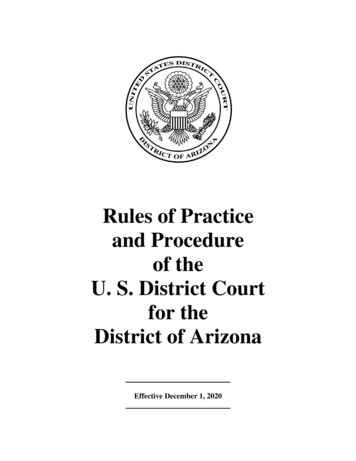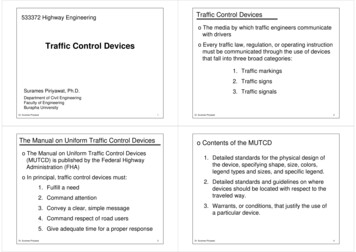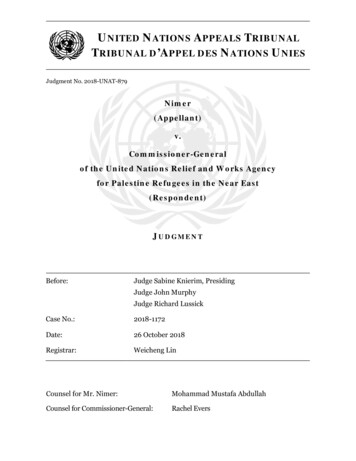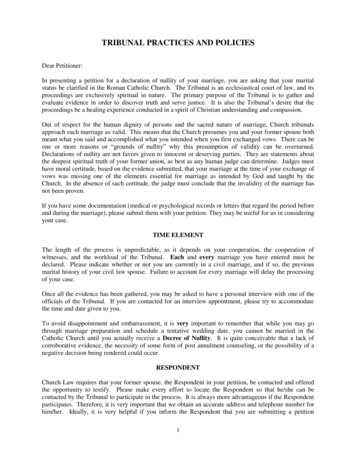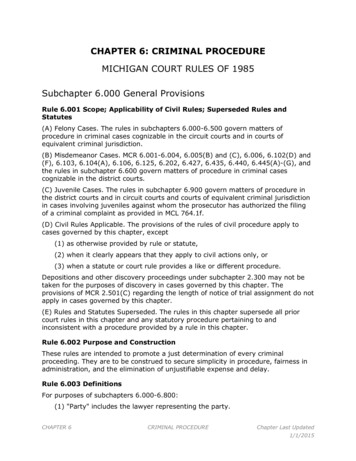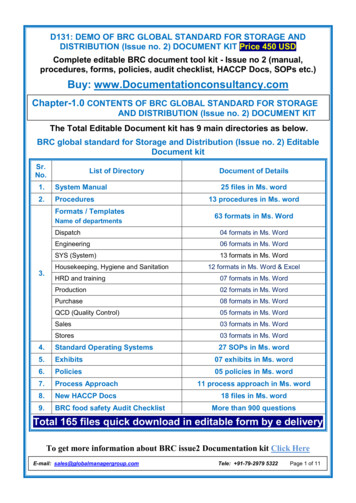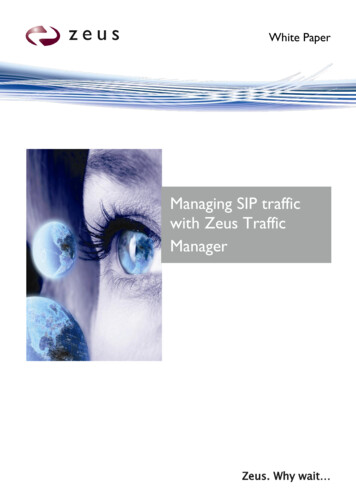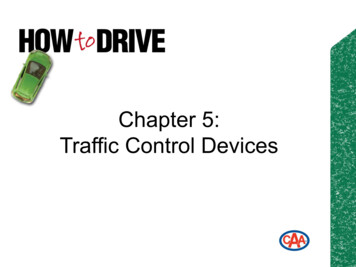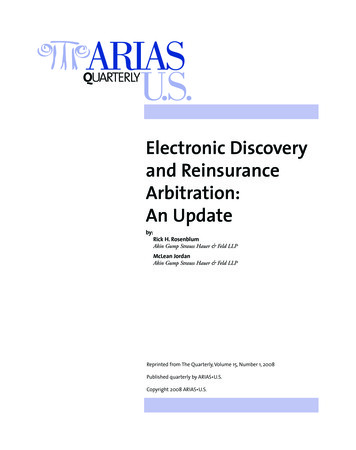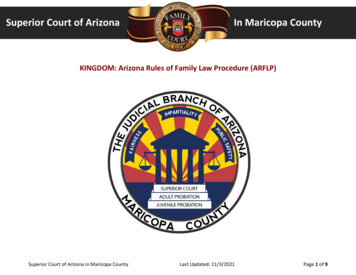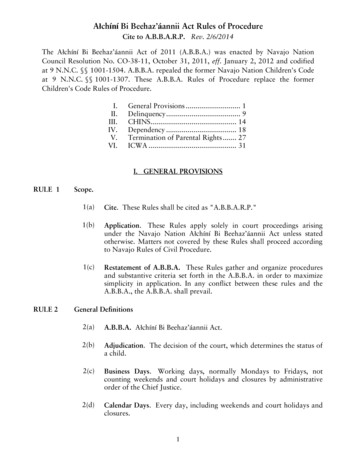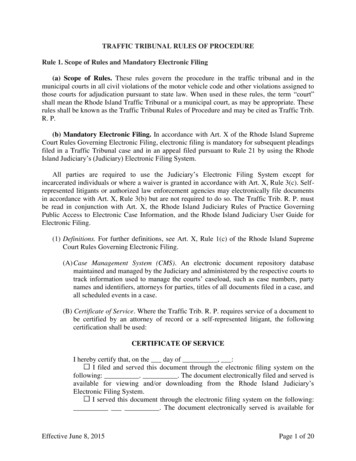
Transcription
TRAFFIC TRIBUNAL RULES OF PROCEDURERule 1. Scope of Rules and Mandatory Electronic Filing(a) Scope of Rules. These rules govern the procedure in the traffic tribunal and in themunicipal courts in all civil violations of the motor vehicle code and other violations assigned tothose courts for adjudication pursuant to state law. When used in these rules, the term “court”shall mean the Rhode Island Traffic Tribunal or a municipal court, as may be appropriate. Theserules shall be known as the Traffic Tribunal Rules of Procedure and may be cited as Traffic Trib.R. P.(b) Mandatory Electronic Filing. In accordance with Art. X of the Rhode Island SupremeCourt Rules Governing Electronic Filing, electronic filing is mandatory for subsequent pleadingsfiled in a Traffic Tribunal case and in an appeal filed pursuant to Rule 21 by using the RhodeIsland Judiciary’s (Judiciary) Electronic Filing System.All parties are required to use the Judiciary’s Electronic Filing System except forincarcerated individuals or where a waiver is granted in accordance with Art. X, Rule 3(c). Selfrepresented litigants or authorized law enforcement agencies may electronically file documentsin accordance with Art. X, Rule 3(b) but are not required to do so. The Traffic Trib. R. P. mustbe read in conjunction with Art. X, the Rhode Island Judiciary Rules of Practice GoverningPublic Access to Electronic Case Information, and the Rhode Island Judiciary User Guide forElectronic Filing.(1) Definitions. For further definitions, see Art. X, Rule 1(c) of the Rhode Island SupremeCourt Rules Governing Electronic Filing.(A) Case Management System (CMS). An electronic document repository databasemaintained and managed by the Judiciary and administered by the respective courts totrack information used to manage the courts’ caseload, such as case numbers, partynames and identifiers, attorneys for parties, titles of all documents filed in a case, andall scheduled events in a case.(B) Certificate of Service. Where the Traffic Trib. R. P. requires service of a document tobe certified by an attorney of record or a self-represented litigant, the followingcertification shall be used:CERTIFICATE OF SERVICEI hereby certify that, on the day of , :I filed and served this document through the electronic filing system on thefollowing: . . The document electronically filed and served isavailable for viewing and/or downloading from the Rhode Island Judiciary’sElectronic Filing System.I served this document through the electronic filing system on the following:. The document electronically served is available forEffective June 8, 2015Page 1 of 20
viewing and/or downloading from the Rhode Island Judiciary’s Electronic FilingSystem.I mailed orhand-delivered this document to the attorney for the opposingparty and/or the opposing party if self-represented, whose name is at thefollowingaddress./s/ NAME(C) Electronic Filing System (EFS). An approved Judiciary-wide system for the filing andservice of pleadings, motions, and other documents or information via electronic meanssuch as the Internet, a court-authorized remote service provider, or through other remotemeans to and from the Judiciary’s CMS.(D) Filing. Where the Traffic Trib. R. P. require a document to be filed in a Traffic Tribunalcase, filing shall mean the electronic transmission of a document in electronic form to orfrom a court/clerk through the Judiciary’s electronic filing system or scanned and filedinto the Judiciary’s CMS at the clerk’s office.(E) Notice. Where the Traffic Trib. R. P. require notice to be given, notice shall meanelectronic notice using the EFS unless stated otherwise.(F) Registered User. An individual or entity with an assigned username and passwordauthorized by the Judiciary to access and utilize the EFS.(G) Public Access Portal. The point of entry for electronic access to case information fromthe Judiciary’s database whether at the courthouse or remotely. The database is anelectronic collection of court records displayed as a register of actions or docket sheet.The register of actions or docket sheet lists parties, case events, document filings, or otheractivities in a case set forth in chronological order.(H) Service. Where the Traffic Trib. R. P. require a document or information to be served,sent, delivered, or forwarded, the following shall be applicable:(i) Subpoenas, complaints, petitions, or other documents that must be hand-delivered orserved in person with a summons shall not be served electronically;(ii) All other service or notice within a case shall be electronic using the EFS unlessstated otherwise; and(iii) All discovery on a case shall be electronically served using the EFS except when thediscovery is of a type which does not lend itself to electronic service (either because itconsists of non-conforming documents or is too voluminous), in which caseconventional service shall be used.(I) Signature. Where the Traffic Trib. R. P. require an electronic signature on any document,Effective June 8, 2015Page 2 of 20
including the eCitation, the signature shall be reflected as /s/ NAME unless statedotherwise.(2) Electronic Filing of Documents. When using the EFS:(A) When filing an appeal, any required documents, attachments, or exhibits shall besubmitted individually as separate files within the same initial submission or filing;(B) All subsequent pleadings, motions, and other papers, shall be submitted individually withrelated documents submitted as separate files within the same submission or filing (forexample, a motion and memorandum or other supporting attachments or exhibits filed insupport of a motion); and(C) Categories of items such as bills, receipts, invoices, photographs, etc. may be submittedin one attachment.For specific requirements, see the Traffic Tribunal’s Electronic Filing System Guidelines.(3) Clerk Review; Acceptance/Rejection Procedure: Following submission, the TrafficTribunal shall timely review the electronically filed document(s) and shall notify the filing partyas to whether the filing is accepted or rejected. Upon acceptance, the submitted document(s)shall be entered into the docket of the case and the docket shall reflect the date and time of filingas set forth in Article X, Rule 5(b) of the Rhode Island Supreme Court Rules GoverningElectronic Filing. In accordance with Article X, Rule 5(c), grounds for the rejection of adocument submitted to the EFS in the Traffic Tribunal are limited in scope as follows:(A) Pleadings filed without a conventional signature where required;(B) Appeals filed without the required documents as set forth in the Traffic Tribunal’sElectronic Filing System Guidelines;(C) Pleadings not filed in accordance with Rule 1(b)(2);(D) Depositions not filed in accordance with Rule 10(c);(E) Documents, including any required documents, attachments, or exhibits, scanned in thewrong orientation, e.g., upside down or backwards;(F) Documents scanned and filed that are unreadable or illegible;(G) Documents filed in a fillable portable document format (PDF);(H) The document filed does not match the selected filing code type;(I) The document is filed into the wrong case;(J) The document contains the wrong or incomplete case caption;Effective June 8, 2015Page 3 of 20
(K) The document is filed with no case identification;(L) The document was improperly scanned or uploaded;(M) The party name, party address, or document name exceeds the number of allottedcharacters in the EFS;(N) The filer added a party or participant that is not configured in the CMS or does not matchthe information in the case;(O) A payment processing error occurred; and/or(P) A technical submission error occurred.Rule 2. Purpose and ConstructionThese rules are intended to provide for the just determination of every civil traffic violationproceeding and other violations assigned to the court for adjudication pursuant to state law. Theyshall be construed to secure simplicity in procedure, fairness in administration, and theelimination of unjustifiable expense and delay; they shall also be construed consistent with thefact that they constitute the rules for the adjudication of civil, not criminal, violations of themotor vehicle code and other statutes within the court’s jurisdiction, hereinafter referred to as the“law.”Rule 3. The Summons(a) Content. The summons shall consist of a listing of the civil violations alleged by theissuing officer and a requirement that the defendant appear in court on the date and time and atthe place indicated thereon. For the purposes of these rules, the terms “ticket,” “citation,”“eCitation,” and “summons” are synonymous and may be used interchangeably. The content andform of the summons and eCitation shall be prescribed by the chief magistrate of the traffictribunal, subject to the approval of the Rhode Island Supreme Court.(b) Signature and Service. The summons shall be signed by the issuing officer alleging thatthe facts contained therein are true, and served upon the defendant in person or by mailing thesummons to the defendant as set forth in Rule 33, which shall be sufficient proof of actual noticein adjudications of civil violations of the motor vehicle code or other applicable statute to justifythe entry of a default judgment in all cases where the defendant fails to appear in court on thedate and time and at the place indicated thereon.(c) Mandatory Hearing and Administrative Payments. The issuing officer shall note onthe summons whether the violation requires a hearing or is one which may be eligible to be paidadministratively pursuant to law. If eligible for administrative payment, the officer shall alsonote on the summons the full amount of the fine[s] required to be paid.(d) Notice of Violation. A summons which provides the defendant and the court withEffective June 8, 2015Page 4 of 20
adequate notice of the violation being charged shall be sufficient if the violation is charged byusing the name given to the violation by statute. The summons shall state for each count theofficial or customary citation of any statute that the defendant is alleged to have violated. Anerror or omission in the summons shall not be grounds for a reduction in the fine owed, fordismissal of the charged violation(s), or for reversal of a conviction if the error or omission didnot mislead the defendant to his or her prejudice.(e) Amendment of the Summons. A summons may be amended by leave of court, bywritten consent of the adverse party, or at hearing; and leave shall be freely given when justice sorequires.Rule 4. Joinder of ViolationsTwo (2) or more violations may be charged in the same summons in a separate count foreach violation if the violations charged are based on the same transaction or occurrence. Thenumber of violations charged on one (1) or more summonses arising out of the same transactionor occurrence shall not affect the eligibility of the summonses to be paid administrativelypursuant to Rule 5.Rule 5. Payment of Summonses(a) Administrative Payments. Administrative payments are payments pursuant tosummonses which are eligible to be made by mail, online for traffic tribunal summonses only, orin person without the defendant having to appear in court. Any fines which may be paidadministratively pursuant to law shall be paid to the traffic tribunal or the municipal court nolater than seven (7) days before the court hearing date as set forth on the summons.(1) Payment in Full. Administrative payments shall be made in full. The fine shall bepaid in full to the court no later than seven (7) days before the court hearing date asset forth on the summons to avoid appearing at the court hearing.(2) Payment by Mail. If payment is made by mail, it shall be received by the court notlater than seven (7) days before the court hearing date as set forth on the summons toavoid appearing at the court hearing.(3) Online Payments for Traffic Tribunal Summonses. For traffic tribunal summonsesonly, online payments are available twenty-four (24) hours a day, seven (7) days aweek on the Rhode Island Judiciary’s website at www.courts.ri.gov by selecting“Online Payments” on the home page, except when the system is unavailable due toscheduled or other maintenance. Payments made online shall be received by thetraffic tribunal no later than seven (7) days before the court hearing date as set forthon the summons to avoid appearing at the court hearing.(4) Admission of Guilt. Administrative payment of the summons shall be deemed anadmission of guilt to the civil violation(s) charged in the summons.Effective June 8, 2015Page 5 of 20
(5) Administrative Payment Incorrectly Marked on the Summons. If the issuing officerincorrectly notes on the summons that the offense is eligible to be paidadministratively but requires a mandatory hearing, the court shall send a notice to thedefendant with a court hearing date.(6) Fine Amount Incorrectly Marked on the Summons. If the issuing officer incorrectlynotes the fine amount on the summons and the defendant pays the incorrect fineamount, the court shall send a notice to the defendant as to the amount ofunderpayment and the time frame within which the defendant must pay the balance orappear in court or the amount of overpayment. If the defendant appears in court, thejudicial officer shall adjust the fine amount on the summons for the court record.(b) Payments After a Court Hearing. Payment is due immediately following thedisposition of the case. If payment is not made in full, the court shall set a date for a courthearing for a determination of the defendant’s ability to pay. If the defendant fails to appear atthe ability to pay hearing, the court may suspend the license and/or registration and/or issue acivil body attachment in the manner set forth in G.L. 1956 § 8-8.2-3.(1) Periodic Payments. If, following an adjudication and a hearing, the court finds thatthe defendant or judgment debtor is unable to pay the judgment in full, the judicialofficer may enter an order fixing the amount, frequency, and manner of periodicpayments until the judgment is paid in full. Payment shall be received by the datecertain set by the court or the defendant must appear in court, unless otherwiseordered by the court.(2) Failure to Comply with Periodic Plan by the Judgment Debtor. If a judgment debtorhas failed to comply with a periodic payment order or if the court finds willful failureon the part of the judgment debtor to pay a fine previously imposed, the court maysuspend the license and/or registration and/or issue a civil body attachment in themanner set forth in G.L. 1956 § 8-8.2-3 for a judgment debtor who fails to appear.Rule 6. First Appearance(a) Procedure. Except in cases wherein payment has been made administratively pursuant toRule 5, all defendants shall appear before a judicial officer (defined as a judge or a magistrate ofthe court) for the first appearance on the date and time and at the place indicated on thesummons. The police department or law enforcement agency which charged the summons shallbe represented by a prosecutor or law enforcement officer. Because a defendant is before thecourt for a civil violation(s), the defendant is not entitled to appointed counsel but has the optionto retain private counsel.The first appearance shall be conducted in open court, recorded, and shall consist of readingthe summons to the defendant or stating to the defendant the substance of the charge(s) andcalling on the defendant to plead thereto. The judicial officer conducting the first appearanceshall notify the defendant of G.L. 1956 § 31-41.1-7 (the “good driving record” statute).Effective June 8, 2015Page 6 of 20
(b) Default and/or Dismissal. If the defendant or the prosecution shall fail to appear, adismissal or a judgment by default may enter pursuant to Rule 17.Rule 7. Pleas(a) A Defendant May Plead “Guilty” or “Not Guilty” or Seek a Dismissal based on aGood Driving Record. The court may refuse to accept a plea of guilty and shall not accept suchplea without first addressing the defendant personally and determining that the plea has beenmade voluntarily and with understanding of the nature of the charge and the judgment to beimposed. If a defendant refuses to plead or if the court refuses to accept a plea of guilty, the courtshall enter a plea of not guilty and the case will be placed on the trial calendar. The court shallnot enter a judgment upon a plea of guilty unless it is satisfied that there is a factual basis for theplea. Pleas shall be in the form prescribed by this Rule.(b) Good Driving Record. The defendant may seek a dismissal based on a “good drivingrecord” pursuant to the provisions of G.L. 1956 § 31-41.1-7. If the defendant is eligible, the courtshall, except for good cause shown dismiss the matter upon payment of any mandatory costs orfees. To qualify for a dismissal based on a good driving record, an out-of-state defendant shallsubmit a copy of his or her driving record obtained from his or her registry of motor vehicles orother licensing authority, or other evidence satisfactory to the court.Rule 8. Pleadings and Motions Before Trial(a) Defenses and Objections. Any defense or objection which is capable of determinationwithout the trial of the general issues may be raised before trial by motion to dismiss or to grantappropriate relief, as provided in these rules. This includes motions pursuant to Rule 11 entitled“Discovery and Inspection.”(b) Time. The motion shall be made no later than fourteen (14) days after the firstappearance, but the court may permit it to be made within a reasonable time thereafter.(c) Determination. A motion before trial raising defenses or objections shall be determinedbefore trial unless the court orders that it be deferred for determination at the trial of the generalissue.Rule 9. Joinder of Summonses and PartiesThe court may order two (2) or more summonses to be tried together if the violations couldhave been joined in a single summons or in the interests of judicial economy. The court mayorder two (2) or more defendants to be tried together if they are alleged to have participated inthe same transaction or occurrence or series of transactions or occurrences, or in the interests ofjudicial economy.Effective June 8, 2015Page 7 of 20
Rule 10. Depositions(a) Refusal Cases. In cases where the defendant has been charged with refusal to submit to achemical test, the procedure for the taking of depositions set forth in Rules 29 and 30 of theDistrict Court Civil Rules shall apply. All expenses shall be borne by the party noticing andtaking the deposition unless upon motion, good cause is shown.(b) All Other Cases. The court at any time after the filing of the summons may upon motionof a party and good cause shown order that a witness’s testimony be taken by deposition. In suchcases, the procedure for the taking of depositions as set forth in Rules 29 and 30 of the DistrictCourt Civil Rules shall apply with all expenses borne by the moving party.(c) Filing. Depositions shall not be filed with the court until they are used in the proceedingor the court orders their filing.Rule 11. Discovery and Inspection(a) Defendant’s Statements. Police reports of examinations and tests and statementsshowing that the defendant has been advised of the defendant’s rights shall be made available tothe defendant upon written request; the attorney or prosecuting officer for the state, city, town, oragency shall permit the defendant to inspect and copy or photograph said reports and statements.(b) Other Books, Papers, Documents, Tangible Objects, or Places. Upon motion of thedefendant, the court may order the attorney for the state or prosecuting officer to permit thedefendant to inspect and copy or photograph books, papers, documents, photographs, tangibleobjects, buildings or places, or copies or portions thereof which are within the possession,custody or control of the state, city, town or agency upon a showing of materiality to thepreparation of the defendant’s defense and that the request is reasonable.(c) Discovery by the State. If the court grants relief sought by the defendant undersubdivision (b) of this rule, it may, upon motion of the state, city, town, or agency, condition itsorder by requiring that the defendant permit the state, city, town, or agency, to inspect and copyor photograph scientific or medical reports, books, papers, documents, tangible objects, or copiesor portions thereof, which the defendant intends to produce at the trial and which are within thedefendant’s possession, custody, or control, upon a showing of materiality to the case and thatthe request is reasonable.(d) Protective Orders. Upon a sufficient showing, the court may at any time order that thediscovery or inspection be denied, restricted or deferred, or make such other order as isappropriate.(e) Time of Motions. A motion or written request under this rule shall be made only withinfourteen (14) days after the first appearance or at such reasonable later time as the court maypermit. The motion shall include all relief sought under this rule. A subsequent motion may bemade only upon a showing of cause why such motion would be in the interest of justice.(f) Continuing Duty to Disclose; Failure to Comply; Motion to Compel.Effective June 8, 2015Page 8 of 20
(1) Continuing Duty to Disclose. If, subsequent to compliance with an order issuedpursuant to this rule, and prior to or during trial, a party discovers additional materialpreviously requested or ordered which is subject to discovery or inspection under therule, the party shall promptly notify the other party’s attorney, the self-representedlitigant, or the court of the existence of the additional material.(2) Failure to Comply. If at any time during the course of the proceeding it is brought tothe attention of the court that a party has failed to comply with this rule, the court mayon motion order such party to permit the discovery or inspection of materials notpreviously disclosed, grant a continuance, or prohibit the party from introducing inevidence the material not disclosed, or it may enter such other order as it deems justunder the circumstances.Rule 12. Subpoena(a) For Attendance of Witnesses; Form; Issuance. Every subpoena shall be issued by theclerk of court or a notary public or other officer authorized by statute. The subpoena shall statethe name of the court and the title of the action and shall command each person to whom it isdirected to attend and give testimony at a time and place therein specified.(b) For Production of Documentary Evidence and of Objects. A subpoena may alsocommand the person to whom it is directed to produce the books, papers, documents, or tangiblethings designated therein. The court, on motion made promptly, may quash or modify thesubpoena if compliance would be unreasonable or oppressive. The court may direct that books,papers, documents, or objects designated in the subpoena be produced before the court at a timeprior to the trial or prior to the time when they are to be offered in evidence and may upon theirproduction permit the books, papers, documents, or objects or portions thereof to be inspected bythe parties and their attorneys.(c) Service. A subpoena may be served by a duly authorized officer in accordance with Title9, Chapter 5 (Writs, Summons, and Process) of the Rhode Island General Laws or by any otherperson who is not a party and who is not less than eighteen (18) years of age. Service of asubpoena shall be made by delivering a copy thereof to the person named and tendering to theperson the fee for one day’s attendance and the mileage allowed by law. When the subpoena isissued on behalf of the state or an officer or agency thereof, fees and mileage need not betendered.(d) Place of Service. A subpoena requiring the attendance of a witness at a hearing or trialmay be served at any place within the State of Rhode Island.Rule 13. Place of Prosecution and Trial(a) Traffic Tribunal. Cases pending before the traffic tribunal shall be adjudicated at a placedesignated by the chief magistrate.Effective June 8, 2015Page 9 of 20
(b) Municipal Courts. Cases pending before a municipal court shall be adjudicated at theplace determined by state law or local ordinance.Rule 14. Motion to Transfer(a) Transfer to Different Session. For the convenience of the parties and witnesses, and inthe interests of justice, the court upon motion of the defendant may transfer the proceeding as tothe defendant to another session of the court held at a different place.(b) Transfer From Municipal Court to Traffic Tribunal. If, a municipal court shallascertain that all of the municipal judges are unable to hear and decide the matter within thejurisdiction of that municipal court pursuant to Chapter 18 of Title 8, it shall be the duty of themunicipal court to order the transfer of the case, together with all the papers, documents, andrecords of testimony connected with the case, within five (5) days to the traffic tribunal. Uponthe transfer, the traffic tribunal shall proceed to hear and decide the case in the same manner as ifit had been instituted in that court in the first instance.(c) Time of Motion. A motion to transfer under these rules may be made at or before the firstappearance or at such other time as the court or these rules may prescribe.Rule 15. Trials(a) Opening Statements and Closing Arguments. Opening statements shall be permitted; atime limit may be set within the discretion of the judicial officer. Closing arguments shall also bepermitted; a time limit may be set within the discretion of the judicial officer.(b) Rules of Evidence. In all adjudications of civil violations before the traffic tribunal andthe municipal courts, the Rhode Island Rules of Evidence shall apply.Rule 16. Motion to DismissThe court, on motion of a defendant or of its own initiative, shall at the close of the evidenceoffered by the prosecution order the dismissal of one (1) or more violations charged in thesummons if the evidence is insufficient to sustain such violation or violations to a standard ofclear and convincing evidence. If a defendant’s motion to dismiss is not granted, the defendantmay offer evidence without having reserved the right to offer such evidence.Rule 17. Judgment(a) Burden of Proof. The burden of proof shall be on the prosecution to a standard of clearand convincing evidence. Following an adjudication of the charged violation(s), a judgment shallenter on a separate document signed by the judicial officer that the defendant is “guilty” or “notguilty” of violating the motor vehicle code or other applicable statute.(b) Judgment. All judgments shall be in writing. A judgment shall set forth the plea oradjudication and the sentence. If the defendant is found not guilty or the charge is dismissed,judgment shall be entered accordingly. The judgment shall be signed by the judicial officer.Effective June 8, 2015Page 10 of 20
(c) Default Judgment. A default judgment may enter against the defendant upon thedefendant’s failure to appear at a trial and/or the first appearance. A default judgment may enterupon proof that:(1) The officer issued the summons consistent with the statutory requirements as set forthin Rule 3(b); and(2) A copy of the summons was served upon the defendant in person or by mailing to hisor her last known address.Upon entry of a default judgment, the defendant’s operator’s license and/or privileges may beordered suspended pending compliance with the judgment imposed in the discretion of the court.(d) Dismissal. If the prosecution fails to appear for trial and/or the first appearance, thematter may be dismissed.Rule 18. Sentence(a) Entry of a Judgment of Guilty. Upon plea or entry of a judgment of guilty, sentenceshall be imposed without unreasonable delay. Before imposing sentence, the court shall affordcounsel an opportunity to speak on behalf of the defendant and shall address the defendantpersonally and ask the defendant if the defendant wishes to make a statement in the defendant’sown behalf and to present any information in mitigation of punishment.(b) Withdrawal of Plea. A motion to withdraw a plea of guilty may be made only beforesentence is imposed.Rule 19. Clerical MistakesClerical mistakes in judgments, orders, or other parts of the record and errors therein arisingfrom oversight or omission may be corrected by the court at any time on its own initiative or onthe motion of any party and after such notice, if any, as the court orders.Rule 20. Relief from Judgment or OrderThe court may, upon motion or on its own initiative, relieve a party or a party’s legalrepresentative from a judgment or order for the following reasons:(a) Mistake, inadvertence, surprise, or excusable neglect;(b) Newly discovered evidence;(c) Fraud, misrepresentation, or misconduct of an adverse party;(d) The judgment or order is void;Effective June 8, 2015Page 11 of 20
(e) The judgment or order has been satisfied, released, or discharged, or the judgment ororder is no longer equitable that the judgment or order should have prospective application; or(f) Any other reason justifying relief from the operation of the judgment, or order, includingthat relief is warranted in the interests of justice.The motion shall be made within a reasonable time, and for reasons (a), (b), and (c) not morethan one (1) year after the judgment or order was entered. The filing of a motion under this ruledoes not, in the absence of further action by the court, affect the finality of a judgment or orderor suspend its operation.Rule 21. Appeals(a) Appeals Panel. Any party aggrieved by a judgment of a municipal court or the traffictribunal following the adjudication of a civil violation of the motor vehicle code or otherapplicable statute may appeal the judgment to the appeals panel of the traffic tribunal. An appealmay be claimed by
Island Judiciary's (Judiciary) Electronic Filing System. All parties are required to use the Judiciary's Electronic Filing System except for incarcerated individuals or where a waiver is granted in accordance with Art. X, Rule 3(c). Self-represented litigants or authorized law enforcement agencies may electronically file documents
